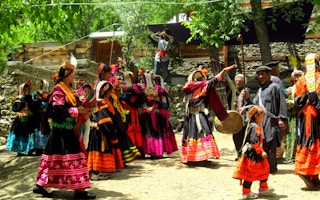CHITRAL, PAKISTAN, 22 March, 2016 − The culture, rituals and existence of the small Kalash community – living in three remote valleys of Chitral district in the foothills of the Hindu Kush mountain range in northwest Pakistan − are under threat from various factors associated with climate change.
There are believed to be only about 4,000 Kalash living in this region. With their light complexions and rituals centred on a worship of nature, some say they are thedescendants of the armies of Alexander the Great, which invaded the area in the 4th century BC.
“Kalashas are like a museum of this country and must be protected,” says Shahigul, a Kalash community leader in the Bumburet valley, close to Pakistan’s border with Afghanistan.
Erratic monsoon
“In the past, our culture and rituals were under threat from outsiders, but now we are much more worried about our future due to recurring flashfloods in our valleys,” she says.
Sudden downpours and an increasingly erratic monsoon – together with the ever-present danger of earthquakes – are taking their toll on the Kalash, who are dependent on the land for their livelihood.
The melting of glaciers in the Hindu Kush mountain range and sudden surges of water in mountain valleys is another threat.
“We lost our houses, crops, orchards and livestock last year due to flooding, and now there is little left for us,” Shahigul says.
Locals say the climate in their long, steep valleys is changing. They say that deforestation is another reason for the increased occurrence of flashfloods in the region, with outsiders coming in to chop down trees.
Bajur Khan, another senior figure in the Kalash community, says the 2015 flooding – which also destroyed centuries-old walnut trees − was particularly bad.
“Almost 80% of my arable land was washed away,” he says. “I managed to rescue just two 40kg sacks of maize, instead of the usual 30 sacks I used to collect each year. We are scared about the future and want to leave the area.”
The Kalash, and the mountain valleys they live in, were once a magnet for local and foreign tourists, providing income that helped these unique communities to survive.
But now there are few visitors in the area – due to changes in climate and to security issues associated with the Taliban and conflict in nearby Afghanistan.
The Kalash have fought hard to retain their customs and their special way of life. Although some have become Muslim, most still follow animistic religious traditions.
The women also continue to wear their intricate, colourful costumes, and there is a lively round of festivals, with music and dancing, red wine and organic food. Funerals in the Kalash community are particularly lavish affairs.
Infrastructure repair
The Kalash say local government officials have colluded with timber merchants who come to chop down trees. And they say that little has been done to repair roads and bridges destroyed in the floods.
Government officials say the Pakistan army has helped repair some infrastructure. They also say the flash floods of 2015 were due to cloudbursts, and that deforestation was not responsible for the damage caused.
But Amir Muhammad Khan, programme manager at Focus Humanitarian Assistance, an international organisation that supports emergency relief following natural disasters, says weather patterns in Chitral have completely changed in recent years.
“The patterns of the rains has altered, with sudden monsoon rainfalls in the summer months,” he says. “The growing cycle of crops and fruit has also changed. We are seeing very different weather.”










